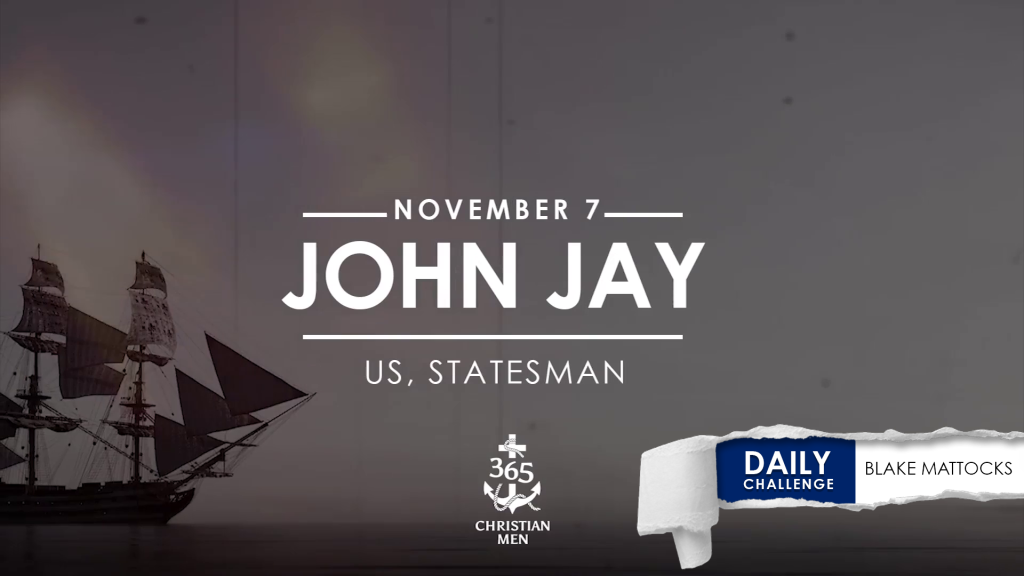November 7. John Jay. In the colonies, Jay was a successful lawyer. Three years after the Declaration of Independence was signed, he served as president of the Continental Congress, which coordinated the American colonies’ resistance to Britain during the first years of the Revolutionary War.
The young government sent Jay to Spain to get their government to recognize the newborn nation and to fund their war against Great Britain. Jay knew he would need God’s wisdom and help, but he never imagined it would be the voyage itself that would put his trust in God on display.
On this date in 1779, Jay survived the storm-damaged ship named Confederacy.
Even when we are in danger, we can trust God with our lives.
In late October, Jay and his wife Sarah and several others—including French diplomat Conrad Gerard—boarded the ship Confederacy and set sail for Europe.
Despite some choppy seas and seasickness, there was nothing out of the ordinary. But early on the morning of November 7, 1779, while most of the passengers still slept, timber groaned and strained and cracked. Men cried out in alarm.
The men hurried onto the deck and found the mast broken and multiple sails hanging limp and the whole ship tossing wildly in the wind-whipped sea.
Sarah Jay later told her mother, “We had been deprived of nothing less than our bowsprit, foremast, main-mast, and mizen-mast, so that we were in an awkward situation.”
Seems Mrs. Jay had a knack for understatement.
After a long and frightening day and with the ship somewhat under control, the passengers again retired to their beds.
But the following morning, they found the rudder damaged. Now there was serious doubt they would ever reach their destination—or escape with their lives.
As the crew devised a makeshift rudder, Jay refused to become alarmed. In fact, Jay’s wife credited his “amiable example” of trusting God to remind her who was in control of their lives.
Jay proceeded to meet with the Captain and the French Minister to decide their next steps. French Minister Gerard wanted to continue to their original destination, but the Captain feared it would not be safe to sail that route. Instead, he suggested the British West Indies, where Jay and Gerard and the other passengers could secure a different ship to Europe.
As the conflict between the men raged, Jay stood quiet in the middle, certain that he knew the One who could command the wind and the waves.
“He got up, rebuked the wind and said to the waves, ‘Quiet! Be still!’ Then the wind died down and it was completely calm. He said to his disciples, ‘Why are you so afraid? Do you still have no faith?’ They were terrified and asked each other, ‘Who is this? Even the wind and the waves obey him!’” (Mark 4:39–41 NIV).
So Jay used his lawyer skills to question the officers about routes and weather and sailing a damaged ship. After listening to their reasoning, he had them explain all of it again in writing. He presented their arguments for heading to the West Indies to Gerard without comment.
But Gerard turned sulky and refused to respond, so Jay yielded to the Captain’s decision. The Confederacy headed to Martinique. As a reward for Jay’s efforts to make a wise and informed decision, he endured the displeasure of the French Minister, who “ceased to observe that cordiality and frankness, which had before attended his conduct to me.” The Jays, however, responded to Gerard with kindness and organized a birthday party for Madame Gerard.
In speaking of Jay’s faith, when they didn’t know what the outcome of the situation would be, Sarah Jay wrote: “It is the property of a diamond to appear most brilliant in the dark, and surely a good man never shines to greater advantage than in the gloomy hour of adversity.”
In confidence, the thoughtful man speaks up. Challenge yourself. Even when we are in danger, we can trust God with our lives.
Stahr, Walter. John Jay: Founding Father. New York: Hambledon and London, 2005, pp 117–119.
Jay, Sarah. “MRS JAY TO HER MOTHER.” In Vol 1 (1763–1781), edited by Henry P Johnston, 3,887–3,916. The Correspondence and Public Papers of John Jay. New York: GP Putman’s Sons, 1890.
Story read by: Peter R Warren, https://www.peterwarrenministries.com/





